What is a combi boiler?
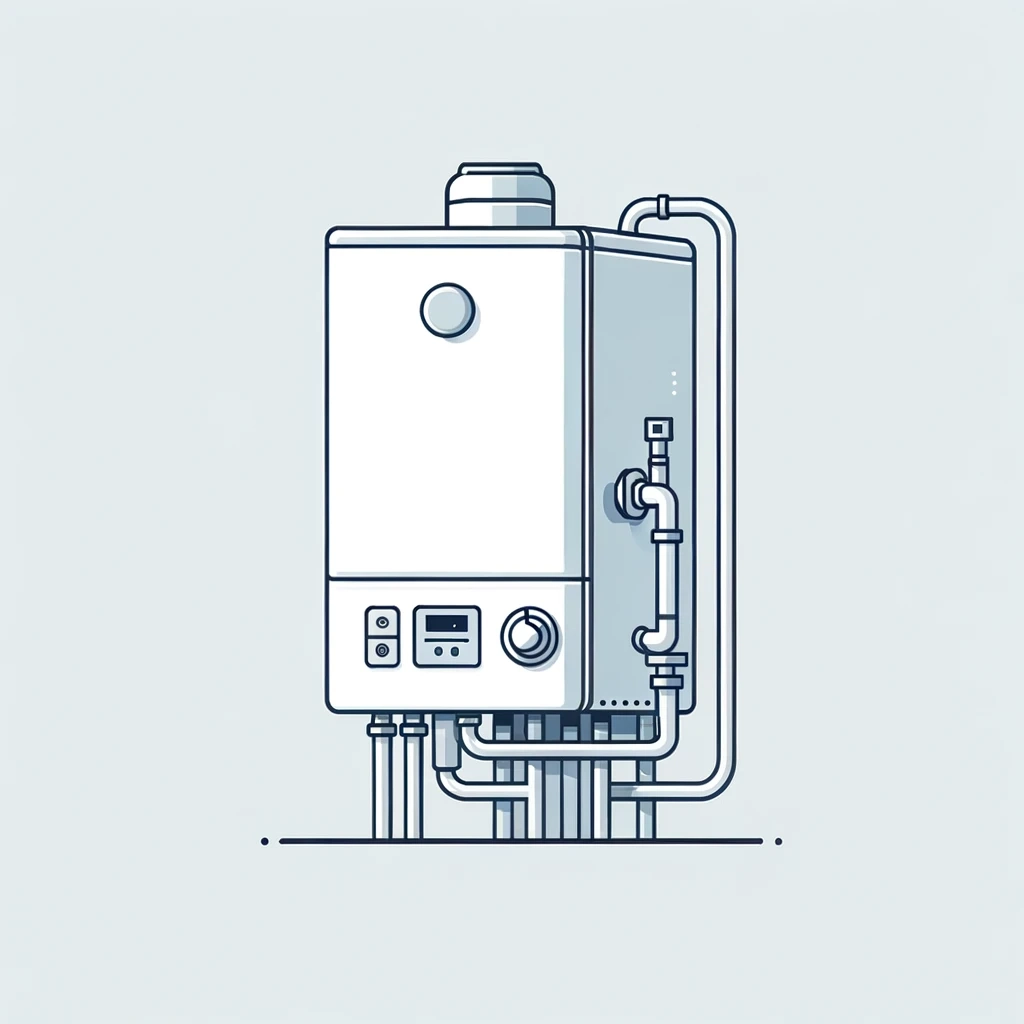
In the realm of home heating solutions, combi boilers have established a formidable reputation for their compact design and heating efficiency. Originating in Europe, these wall-mounted marvels have gained traction worldwide for their ability to provide hot water and central heating from a singular unit. The term ‘combi’ is derived from the word ‘combination’, signifying their dual functionality.
Their compact nature makes them particularly appealing to homeowners with limited space. When embarking on a journey towards understanding combi boilers, one must first unravel their integral operation mechanism.
Unlike traditional boiler systems that require separate hot water storage tanks, combi boilers are designed to heat water directly from the mains when you turn on any hot tap in your house. This feature eliminates the need for any waiting period, providing immediate access to hot water.
The necessity of regular combi boiler servicing can’t be overstressed. Even though these units are renowned for their reliability and longevity, they aren’t immune to wear and tear over time.
Regular servicing ensures that these units are operating at optimal efficiency while preempting potential issues that could lead to costly repairs or replacements. Occasionally, homeowners may encounter situations necessitating combi boiler repair even with regular servicing; however, this is typically less frequent compared with traditional systems due to fewer moving parts within the unit.
It’s essential to promptly address these concerns as when left unchecked; minor issues can exacerbate into profound complications risking system failure. Despite being essentially DIY-repellent due to advanced technological components involved in its operation mechanism, installation of a new combi boiler isn’t daunting when placed in capable hands of certified technicians specializing in combi boiler installation.
How Combi Boilers Work
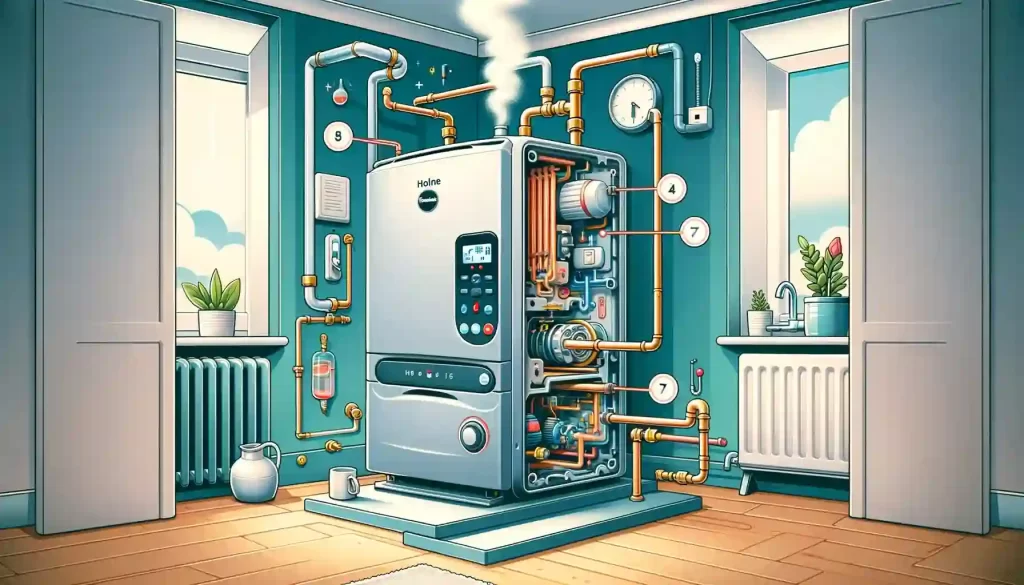
Combination or ‘combi’ boilers are an innovative space-saving solution that has gained popularity in the UK. These boilers seamlessly integrate water heating and central heating functions into a single compact unit. In this section, we’ll delve into the inner workings of combi boilers and their advantages.
Instantaneous Hot Water
Combi boilers are aptly named because they combine two essential functions: heating water and providing central heating. The beauty of these units lies in their ability to draw water directly from the mains supply, eliminating the need for hot water storage cylinders or cold-water storage tanks in your loft.
Triggering Hot Water Production
When you turn on a hot water tap, the combi boiler swiftly responds to your demand. It has an integrated sensor that detects the need for hot water and triggers an internal heat exchanger.
The Role of the Heat Exchanger
The heat exchanger is a critical component within a combi boiler. It efficiently transfers heat generated from burning gas or another fuel type to the water as it flows through the unit. As a result, hot water becomes available within moments of opening your tap.
Maintenance Matters
To ensure the smooth operation of your combi boiler over time, regular servicing is essential. Neglecting maintenance can lead to costly repairs, often due to issues like limescale buildup in internal components. Consistent checks and services can help prevent these problems.
Uninterrupted Hot Water Supply
One of the key advantages of installing a new combi boiler is not only the instant access to hot water but also the constant water pressure. As long as your mains supply can meet the demand, there will be no drop in performance, even when using multiple water outlets simultaneously. This makes combi boilers ideal for both residential and commercial settings, where high-demand situations are common.
Consider Your Needs
While combi boilers offer many benefits, it’s crucial for potential homeowners to carefully assess their requirements before installation. There is no one-size-fits-all solution when it comes to domestic heating. Factors like property size and family needs should be taken into account to determine which heating system is best suited for your specific situation.
Advantages of Combi Boilers
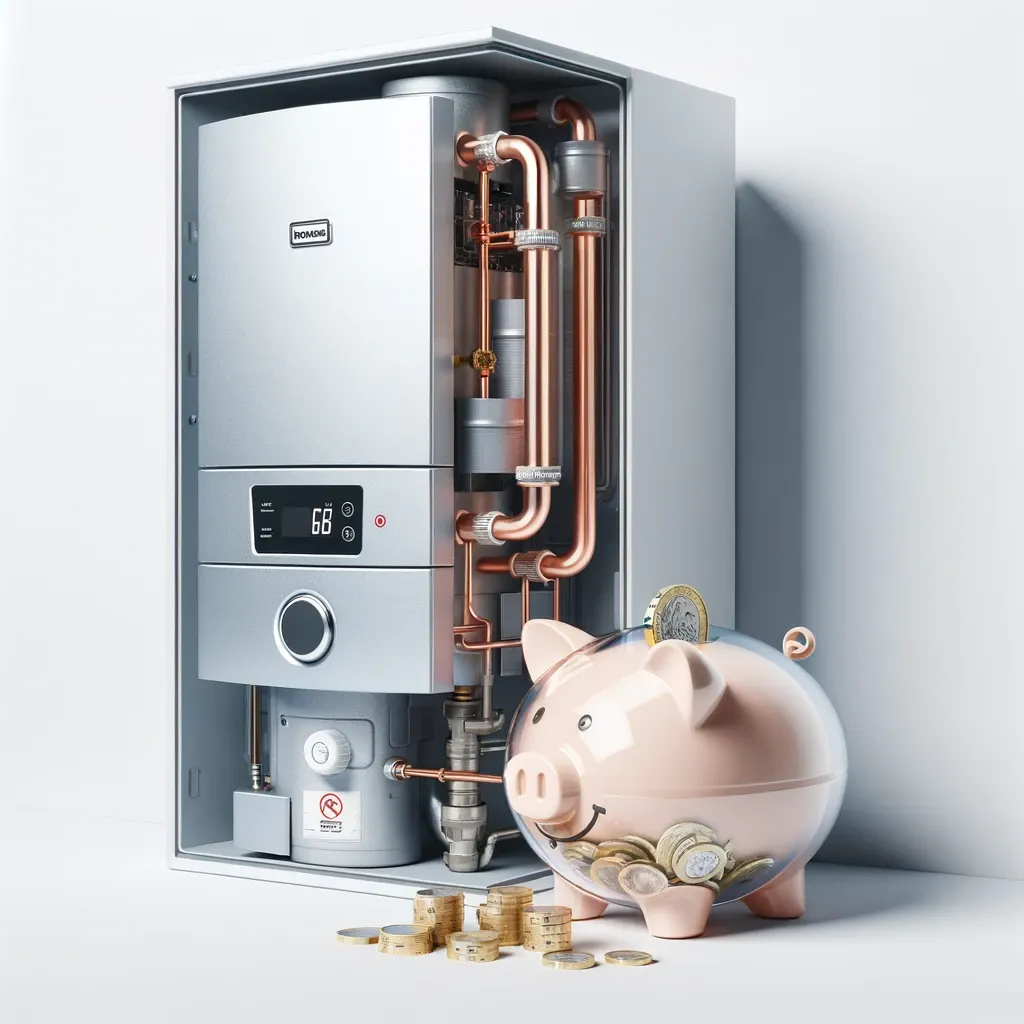
Combination boilers, commonly referred to as “combi” boilers, have revolutionized domestic heating, offering an array of benefits. These innovative units seamlessly integrate hot water production and central heating in a single, efficient package. In this section, we’ll explore the numerous advantages that combi boilers bring to homeowners.
Efficient On-Demand Hot Water
One standout advantage of combi boilers is their exceptional efficiency. Unlike traditional systems that heat water and store it in a tank, combi boilers produce hot water instantly when needed. This eliminates the need for a storage tank and reduces energy waste since there’s no heat loss from idle water in a tank. This not only saves you money on energy bills but also promotes eco-friendliness by minimizing energy consumption.
Compact Design for Space Savings
Combi boilers are renowned for their compact size, making them an ideal choice for smaller homes and apartments where space is precious. The absence of bulky tanks or cylinders creates more room for living spaces or other uses. Additionally, their installation is less invasive and time-consuming compared to other heating systems, simplifying the setup process.
Uniform Heat Distribution
Combi boilers offer uniform heat distribution throughout your home, minimizing temperature fluctuations commonly experienced with other heating methods. The ability to control both hot water and central heating from a single device adds convenience and flexibility to your heating system.
Regular Servicing for Longevity
Given the complexity of combi boilers, routine servicing by professionals specializing in combi boiler maintenance is essential. This maintenance can prolong the unit’s lifespan and ensure its continued efficiency, providing peace of mind for homeowners.
Enhanced Safety Features
Combi boilers operate as sealed systems, reducing the risk of gas leaks significantly when compared to open vented system boilers. This safety feature enhances the well-being of those living within the dwelling and adds an extra layer of security to your home.
Occasional Repairs
While combi boilers offer numerous benefits, their multifunctional nature, combining water heating and home heating, can occasionally lead to issues necessitating repairs. However, the convenience and advantages of combi boilers far outweigh the occasional need for maintenance, making them a worthwhile choice for modern homeowners.
Types of Combi Boilers
Combi boilers come in a diverse range of options, catering to various heating needs. In this section, we’ll explore the primary classifications and the specific characteristics of different types of combi boilers.
Gas Combi Boilers
Gas combi boilers, typically fueled by natural gas or LPG (liquid petroleum gas), offer a conventional heating solution. They require a flue to safely expel waste gases, which may impact their installation location.
Electric Combi Boilers
Electric combi boilers generate heat by converting electricity into thermal energy. These are favored for properties without access to a gas supply or for those prioritizing environmental considerations due to their zero-emission feature. They can be conveniently placed anywhere within your property and do not require a flue.
Further Categorization
Within these broad categories, combi boilers can be further categorized into three distinct types: regular, system, and condensing.
Regular Combi Boilers
Regular combi boilers necessitate storage tanks for both cold and hot water. While they may be less efficient, they excel in providing hot water at multiple usage points simultaneously, making them suitable for certain situations.
System Combi Boilers
System combi boilers are known for their compactness, as they incorporate various components such as an expansion vessel and pump. This integration expedites the installation process, making them an efficient choice.
Condensing Combi Boilers
Condensing combi boilers stand out by recovering heat from waste gases, boosting their overall efficiency. They achieve this by extracting heat that would otherwise be lost through the flue in traditional models. However, due to their intricate internal mechanisms, they may incur higher costs during maintenance or repair.
Oil-Based Combi Boilers
Though less common, oil-based combi boilers are a powerful heating option, particularly suited for larger properties located off-grid. They depend on a supply of oil for operation, offering robust heating performance.
Each type of combi boiler comes with its own set of advantages and disadvantages, influenced by factors like property size, existing infrastructure, and personal preferences. Understanding these nuances is crucial for making an informed decision when selecting the right combi boiler for your specific heating needs.
Choosing the Right Combi Boiler
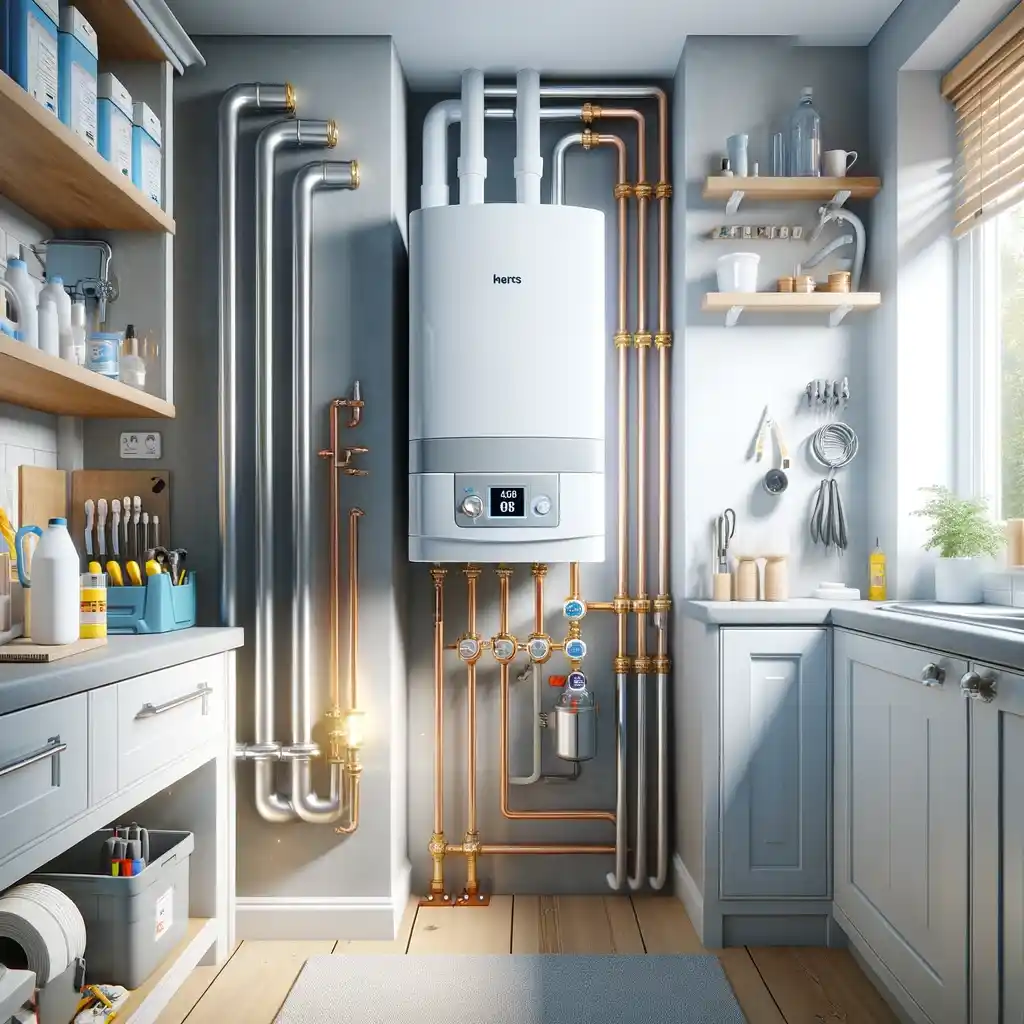
Selecting the ideal combi boiler for your household involves evaluating several crucial factors. Your decision should align with your hot water requirements and the size of your home. In this section, we will explore the essential considerations to make when choosing the right combi boiler.
Match Output to Hot Water Demand
The size of your home and the demand for hot water are primary determinants. For small houses or flats with a single bathroom, a smaller combi boiler is typically adequate. Conversely, larger homes with multiple bathrooms in simultaneous use benefit from models with higher output, ensuring an ample supply of hot water.
Prioritize Energy Efficiency
The energy efficiency rating of the boiler is another pivotal factor. Opting for an A-rated high-efficiency model may incur a higher upfront cost but results in long-term energy bill savings. Additionally, it is an environmentally responsible choice.
Professional Installation is a Must
Combi boiler installation should always be entrusted to experienced professionals. Given the involvement of gas handling, improper installation can pose risks. Rely on trained experts to ensure safety and optimal performance.
Comprehensive Warranty Coverage
Consider brands that provide comprehensive warranty coverage, encompassing both parts and labour. This can save you significant expenses in case of malfunctions, necessitating combi boiler repair or servicing.
Account for Regular Maintenance Costs
When assessing the cost of owning and operating a combi boiler system, factor in regular maintenance expenses, including annual combi boiler servicing. This routine upkeep ensures efficient operation and prolongs the system’s lifespan. Early identification of potential issues during maintenance can prevent high repair costs later on.
Prioritize Brand Reliability
Reliability is paramount when selecting your combi boiler. Investing in well-known brands recognized for their durability reduces the likelihood of requiring costly repairs in the future. Conduct online research, read reviews, or seek advice from professionals to gather insights into brand reputation and performance.
Consider Future-Proofing
Future-proofing considerations, such as ease of servicing and potential upgrades, should also play a role in your decision-making process. Ensuring your combi boiler remains compatible with evolving technologies can enhance its longevity and functionality.
Installation and Maintenance of Combi Boilers
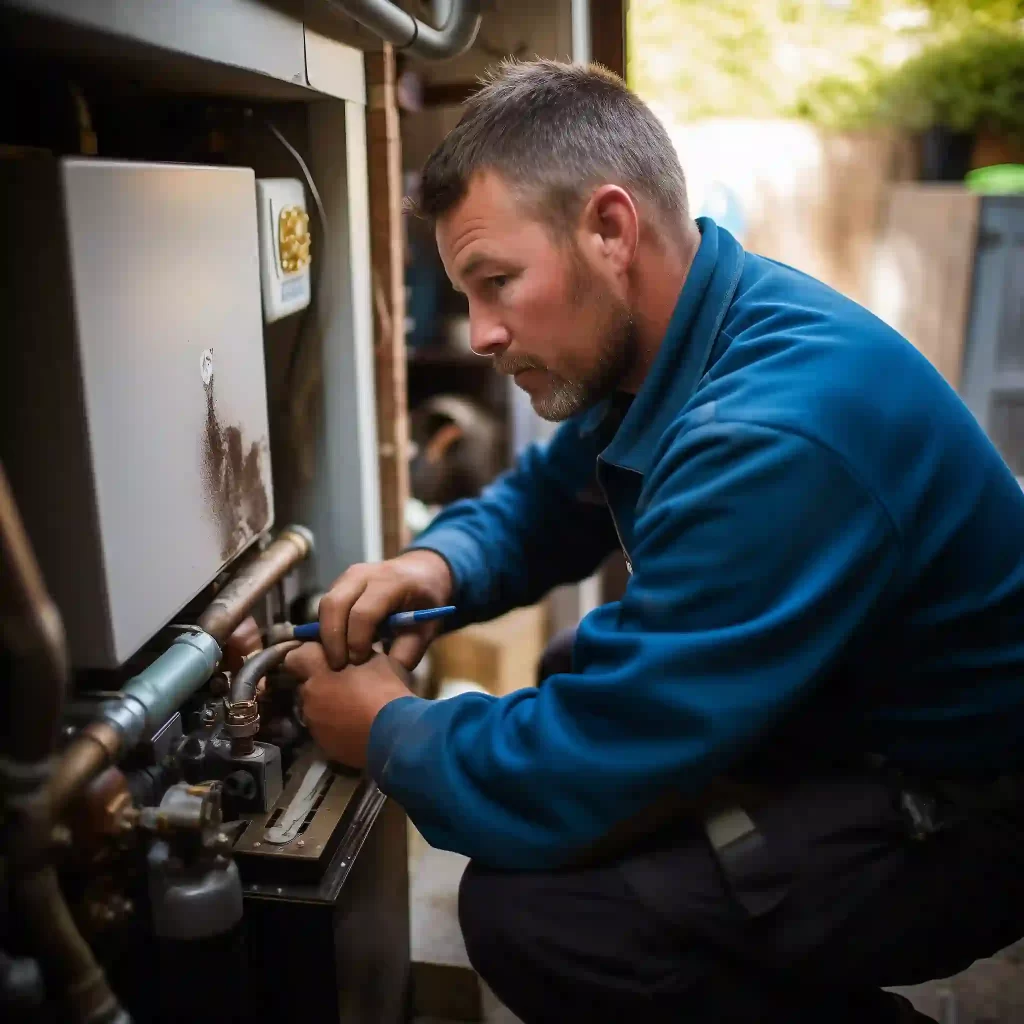
Installing and maintaining a combi boiler is a task that requires the expertise of certified professionals. These heating systems, while intricate, should not pose significant challenges for experienced technicians. In this section, we will explore the critical aspects of combi boiler installation and maintenance.
Professional Installation
Combi boiler installation is a complex task best left to qualified professionals. The process typically involves several key steps:
- Removal of Existing Heating Unit: If applicable, the existing heating unit is removed to make way for the new combi boiler.
- Site Preparation: The installation site is prepared to accommodate the new boiler, ensuring a secure and efficient setup.
- Boiler Installation: The combi boiler is installed, including the necessary connections to your water supply and electricity network.
The duration of installation can vary, ranging from several hours to a couple of days, depending on the complexity of the system. Once installed, the combi boiler undergoes initial testing to verify proper functionality.
Testing and Safety Assurance
Testing phases are crucial to ensure the safety and optimal performance of your newly installed combi boiler. Common tests include checking pressure levels, leak detection, and fault identification. These tests confirm that your combi boiler adheres to safety standards and operates as intended.
Routine Maintenance
Maintaining your combi boiler is essential for prolonging its lifespan and preserving its effectiveness over time. Regular combi boiler servicing plays a vital role in identifying potential issues before they escalate into major problems requiring extensive repairs or replacement. Maintenance typically includes:
- Component Inspection: All components are inspected for signs of wear and tear.
- Cleaning: Necessary parts are cleaned to prevent blockages or reduced efficiency.
- Leak and Blockage Checks: Technicians check for leaks and blockages that could impede performance.
- Safety Device Verification: Certification that safety devices are functioning correctly is crucial for ensuring safety.
Occasional Repairs
While combi boilers are known for their reliability, occasional faults or breakdowns may occur. Common issues include low water pressure, thermostat problems, or unusual noises indicating internal component failure. Repairs should always be entrusted to qualified engineers who can accurately diagnose faults without compromising system integrity or personal safety.
Common Combi Boiler Issues
Combi boilers, like any mechanical device, can encounter various issues over time. In this section, we’ll explore some common problems that combi boiler owners may face and emphasize the importance of regular maintenance to prevent and address these issues.
Loss of Pressure
One prevalent issue is a loss of pressure in combi boilers. During installation, these systems are precisely calibrated to maintain consistent water pressure. However, factors such as leaks or wear and tear can lead to pressure drops, affecting the unit’s efficiency. If you notice sudden changes in hot water or heating flow, it’s advisable to seek professional combi boiler servicing to rectify the issue before it escalates.
Diverter Valve Malfunctions
The diverter valve in a combi boiler plays a pivotal role by directing hot water either to your radiators or your hot water system, depending on demand. If this component malfunctions, you may find yourself without heating or hot water, particularly inconvenient during the winter. Regular combi boiler servicing can detect and address diverter valve issues early, preventing significant breakdowns.
Condensate Pipe Freezing
Combi boilers may face challenges during extremely cold weather conditions, such as the freezing of the condensate pipe. This pipe expels residual condensation generated during the heating process. When exposed to low temperatures, it can freeze, causing blockages that may lead to boiler shutdowns or failures. Homeowners using combi boilers should be aware of this risk and take precautions during winter months.
Ignition Problems
Ignition problems are not uncommon in combi boilers. These systems utilize electronic ignition switches that can fail over time due to continuous use or age-related wear and tear. When this happens, your boiler may fail to ignite, potentially necessitating costly combi boiler repair services.
The Importance of Regular Maintenance
Each of these issues underscores the significance of regular maintenance. Not only does it ensure that your system operates optimally in the long term, but it also provides opportunities to detect minor problems before they evolve into significant disruptions. Regular combi boiler servicing is not just a good practice but also an economically sound one, potentially saving you from the expenses associated with extensive repairs in the future.
Energy Efficiency and Cost Savings

The energy efficiency of combi boilers stands as a remarkable feature that distinguishes them from other heating systems. At the core of their design is the ability to heat water directly from the mains when you open a tap, eliminating the need for a hot water storage cylinder or a cold-water storage tank in the roof space. This ingenious design ensures minimal heat loss, maximizing the conversion of energy utility into heat for your home or hot water.
Unparalleled Energy Efficiency
Combi boilers’ unique ability to bypass the requirement for additional components makes them exceptionally energy-efficient when compared to other boiler types. This efficiency not only reduces energy waste but also lowers your utility bills, making combi boilers an environmentally friendly and cost-effective choice.
Cost Savings Over the Long Term
While the initial upfront costs of combi boilers may be higher than those of conventional boiler systems, the potential for long-term cost savings is substantial. Their superior energy efficiency leads to reduced energy consumption and lower bills. Additionally, their compact size saves space and reduces installation costs, as there’s no need for a separate hot water cylinder or cold-water tank.
Maintenance for Optimal Performance
To fully reap the benefits of energy efficiency and cost savings, regular combi boiler servicing is essential. A well-maintained boiler operates more efficiently and enjoys an extended lifespan, further decreasing costs over time. Timely maintenance not only keeps downtime to a minimum but also prevents minor issues from evolving into major ones, contributing to overall cost savings and avoiding costly replacements.
Prompt Professional Repairs
In the event of issues, professional combi boiler repair services should be sought immediately. This ensures safety and prevents further damage. Prompt repairs not only minimize downtime but also prevent minor problems from escalating into major ones, ultimately saving costs by avoiding premature boiler replacements.
Professional Installation is Paramount
It’s crucial to emphasize that combi boiler installation should always be performed by registered professionals. These experts possess the necessary knowledge and expertise to ensure safe installation in accordance with industry standards. This not only mitigates risks but also guarantees maximum functional efficacy.
Comparing Combi Boilers to Other Heating Systems
A thorough assessment of combi boilers necessitates a comparative analysis with other commonly used heating systems. While combi boilers are often superior, the choice should align with the unique needs and circumstances of each homeowner. In this section, we’ll explore how combi boilers stack up against traditional heating systems and other alternatives.
Traditional Heating Systems
Traditional heating systems operate on separate hot water and central heating circuits and may include a hot water storage cylinder. These systems can be advantageous for households that require substantial hot water simultaneously at multiple outlets.
Combi Boilers’ Compact Nature
Combi boilers, in contrast, are compact and eliminate the need for storage cylinders or cold-water tanks, freeing up significant home space. They provide instant access to heated water directly from the mains, bypassing the periodic delays associated with reheating stored water in conventional systems.
Combi Boiler Installation
Combi boiler installation is generally more straightforward due to their single-unit composition. System boilers are similar to traditional boilers but integrate most components within the boiler itself, simplifying installation and promoting energy efficiency. However, they still require a separate cylinder for storing hot water, which may not be ideal for homes with limited space or those seeking instant hot water supply like combi boilers offer.
Heat-Only or Regular Boilers
Heat-only or regular boilers present another alternative. They rely on a cold-water tank, often placed in loft spaces. This design may not be suitable for homes without loft access or for those who prefer not to allocate loft space solely for boiler-related use. Moreover, any disruption in the cold-water supply can directly impact the functioning of heat-only boilers, unlike combi boilers that draw directly from the mains supply.
Consideration Factors
When comparing other heating systems to combi boilers, factors such as available space, potential disruptions in cold-water supply, and the household’s need for concurrent hot-water access across multiple outlets must be considered.
System Advantages
Each heating system has its unique advantages, and their selection should align optimally with specific user needs. For example, combi boiler installation offers ease, while regular boilers provide greater reliability against cold-water disruptions.
Maintenance Considerations
Decisions regarding combi boiler repair and combi boiler servicing should also hinge on these considerations. Factors like existing warranties, local service availability, and overall costs should be taken into account when choosing the right heating system for your home.
In conclusion, combi boilers offer a versatile and energy-efficient heating solution, ideal for many households. However, the right choice among heating systems depends on individual needs. Traditional systems provide ample hot water, while combi boilers save space and offer instant heating. System boilers simplify installation, while heat-only boilers may be less practical for some. Regular maintenance, prompt repairs, and proper installation are vital considerations. Weighing factors such as space availability, cold-water supply, and hot water demand is key. By making an informed choice, homeowners can enjoy the benefits of an efficient and cost-effective heating system tailored to their specific requirements.
